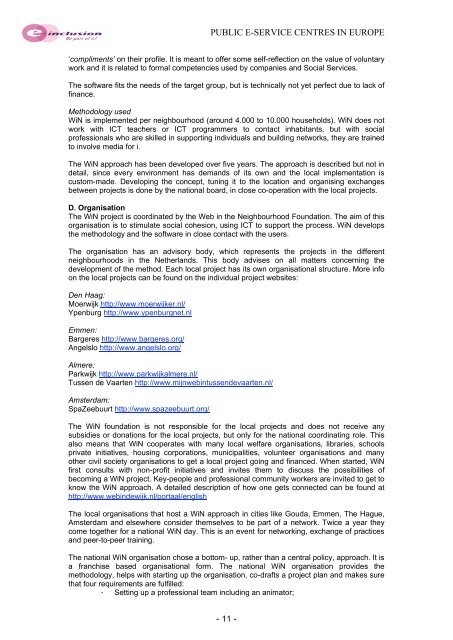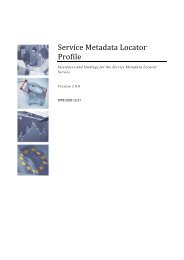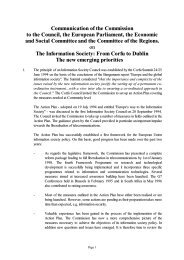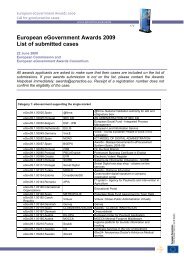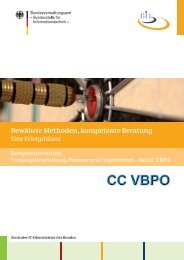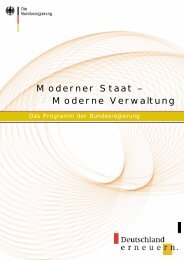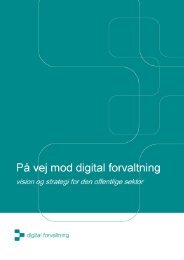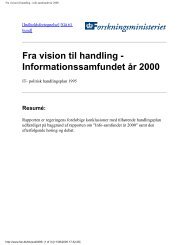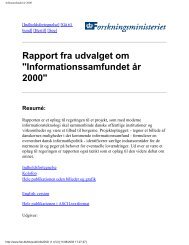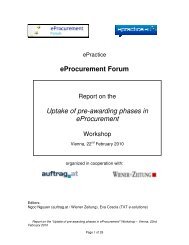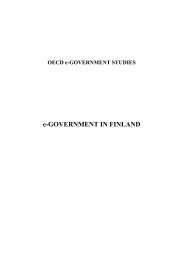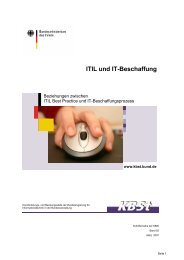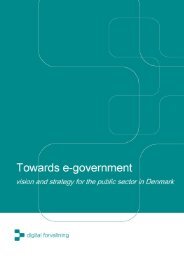Comparative Study of Public e-Service Centres in - ePractice.eu
Comparative Study of Public e-Service Centres in - ePractice.eu
Comparative Study of Public e-Service Centres in - ePractice.eu
Create successful ePaper yourself
Turn your PDF publications into a flip-book with our unique Google optimized e-Paper software.
PUBLIC E-SERVICE CENTRES IN EUROPE<br />
‘compliments’ on their pr<strong>of</strong>ile. It is meant to <strong>of</strong>fer some self-reflection on the value <strong>of</strong> voluntary<br />
work and it is related to formal competencies used by companies and Social <strong>Service</strong>s.<br />
The s<strong>of</strong>tware fits the needs <strong>of</strong> the target group, but is technically not yet perfect due to lack <strong>of</strong><br />
f<strong>in</strong>ance.<br />
Methodology used<br />
WiN is implemented per neighbourhood (around 4.000 to 10.000 households). WiN does not<br />
work with ICT teachers or ICT programmers to contact <strong>in</strong>habitants, but with social<br />
pr<strong>of</strong>essionals who are skilled <strong>in</strong> support<strong>in</strong>g <strong>in</strong>dividuals and build<strong>in</strong>g networks, they are tra<strong>in</strong>ed<br />
to <strong>in</strong>volve media for i.<br />
The WiN approach has been developed over five years. The approach is described but not <strong>in</strong><br />
detail, s<strong>in</strong>ce every environment has demands <strong>of</strong> its own and the local implementation is<br />
custom-made. Develop<strong>in</strong>g the concept, tun<strong>in</strong>g it to the location and organis<strong>in</strong>g exchanges<br />
between projects is done by the national board, <strong>in</strong> close co-operation with the local projects.<br />
D. Organisation<br />
The WiN project is coord<strong>in</strong>ated by the Web <strong>in</strong> the Neighbourhood Foundation. The aim <strong>of</strong> this<br />
organisation is to stimulate social cohesion, us<strong>in</strong>g ICT to support the process. WiN develops<br />
the methodology and the s<strong>of</strong>tware <strong>in</strong> close contact with the users.<br />
The organisation has an advisory body, which represents the projects <strong>in</strong> the different<br />
neighbourhoods <strong>in</strong> the Netherlands. This body advises on all matters concern<strong>in</strong>g the<br />
development <strong>of</strong> the method. Each local project has its own organisational structure. More <strong>in</strong>fo<br />
on the local projects can be found on the <strong>in</strong>dividual project websites:<br />
Den Haag:<br />
Moerwijk http://www.moerwijker.nl/<br />
Ypenburg http://www.ypenburgnet.nl<br />
Emmen:<br />
Bargeres http://www.bargeres.org/<br />
Angelslo http://www.angelslo.org/<br />
Almere:<br />
Parkwijk http://www.parkwijkalmere.nl/<br />
Tussen de Vaarten http://www.mijnweb<strong>in</strong>tussendevaarten.nl/<br />
Amsterdam:<br />
SpaZeebuurt http://www.spazeebuurt.org/<br />
The WiN foundation is not responsible for the local projects and does not receive any<br />
subsidies or donations for the local projects, but only for the national coord<strong>in</strong>at<strong>in</strong>g role. This<br />
also means that WiN cooperates with many local welfare organisations, libraries, schools<br />
private <strong>in</strong>itiatives, hous<strong>in</strong>g corporations, municipalities, volunteer organisations and many<br />
other civil society organisations to get a local project go<strong>in</strong>g and f<strong>in</strong>anced. When started, WiN<br />
first consults with non-pr<strong>of</strong>it <strong>in</strong>itiatives and <strong>in</strong>vites them to discuss the possibilities <strong>of</strong><br />
becom<strong>in</strong>g a WiN project. Key-people and pr<strong>of</strong>essional community workers are <strong>in</strong>vited to get to<br />
know the WiN approach. A detailed description <strong>of</strong> how one gets connected can be found at<br />
http://www.web<strong>in</strong>dewijk.nl/portaal/english<br />
The local organisations that host a WiN approach <strong>in</strong> cities like Gouda, Emmen, The Hague,<br />
Amsterdam and elsewhere consider themselves to be part <strong>of</strong> a network. Twice a year they<br />
come together for a national WiN day. This is an event for network<strong>in</strong>g, exchange <strong>of</strong> practices<br />
and peer-to-peer tra<strong>in</strong><strong>in</strong>g.<br />
The national WiN organisation chose a bottom- up, rather than a central policy, approach. It is<br />
a franchise based organisational form. The national WiN organisation provides the<br />
methodology, helps with start<strong>in</strong>g up the organisation, co-drafts a project plan and makes sure<br />
that four requirements are fulfilled:<br />
- Sett<strong>in</strong>g up a pr<strong>of</strong>essional team <strong>in</strong>clud<strong>in</strong>g an animator;<br />
- 11 -


